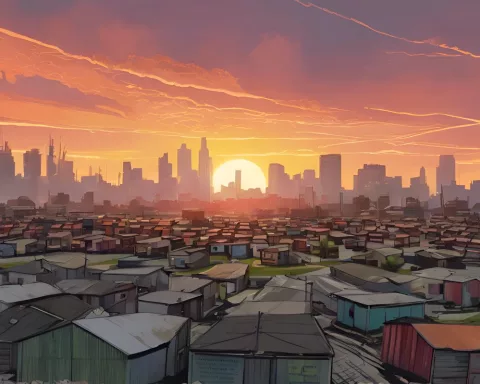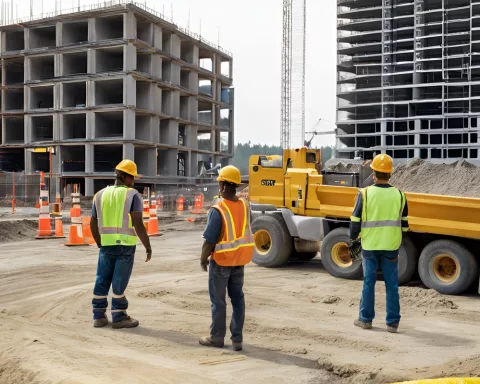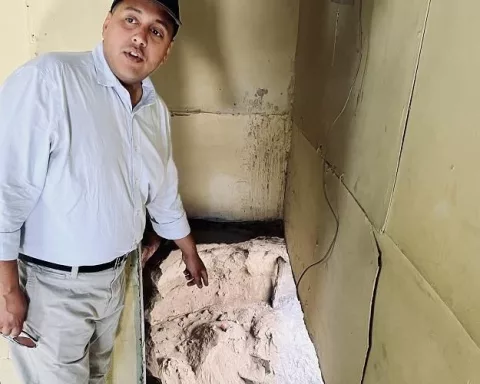Residents of Loyiso Nkohla informal settlement in Cape Town protested for essential facilities, including electricity, water supply, waste disposal bags, and more toilets. The City of Cape Town stated that they have limited resources and obligations towards formal settlements, but assured residents that their concerns are being considered. The community’s fight for basic amenities showcases their resilience and determination to survive and prosper despite neglect.
The residents of Loyiso Nkohla informal settlement in Cape Town staged a protest to demand essential facilities, including electricity, a reliable water supply, waste disposal bags, and more toilets. The City of Cape Town cited limited resources and existing obligations towards formal settlements, but assured the residents that their concerns are being considered seriously and encouraged them to engage in dialogue. The community’s perseverance in the face of hardship serves as a testament to their resilience and their fight for basic amenities is a powerful account of human will to survive and prosper.
The Rising Unrest
In the humming center of Cape Town, tucked between Philippi and Nyanga, a newly relocated community of shanty-dwellers has taken up residence near the Stock Road railway station. Recently, they staged a protest, expressing their deep dissatisfaction with their inadequate living conditions. The residents of the newly named Loyiso Nkohla informal settlement disrupted the rush-hour traffic, vividly highlighting their dire need for essential facilities.
Their protest was marked by the dramatic image of blazing tires and large stones barricading Stock Road and the nearby R300 freeway. This act of desperation was aimed at the City of Cape Town, pleading for the provision of electricity, a reliable water supply, waste disposal bags, and more toilets. The residents felt that they were being overlooked and their concerns ignored. Their public demonstration was a call to the city to acknowledge their needs.
Wesley Twigg, spokesperson for the Western Cape police, confirmed that various law enforcement agencies had reacted to this service delivery protest. They managed to disperse the crowd without the need for police intervention. However, they continue to patrol the area due to the palpable tension that still lingers.
The Residents’ Plight
The relocated inhabitants argue that since their move to the site next to the Stock Road railway station in December, they’ve been denied a sufficient water supply. Their claims are poignant – water trucks have not paid a visit for a fortnight, and waste remains uncollected. It’s impossible not to see the neglect they endure as they attempt to make do amongst an increasing pile of rubbish.
Thembelani Ntelezi, a community leader, expressed the settlement’s complaints, decrying the absence of committed individuals to handle sanitation and the city’s unfulfilled promises of a water supply. According to Ntelezi, the residents rely on neighboring communities for water. He said, ‘We feel we have been dumped here,’ mirroring the feeling of desertion that pervades the settlement. The need for electrification in their homes is pressing, as residents grapple with life in darkness.
Masonwabe Funda, a mother of three and current resident, depends on candles and a paraffin stove for light and cooking, as she cannot afford an illegal connection to the electricity supply of nearby Heinz Park or Acacia Park. Funda and her fellow dwellers remain steadfast in their pledge to protest until their needs are addressed.
The Cry for Help
Funda said, ‘The only language that this government hears is when we take to the streets and burn tyres,’ highlighting the water shortage that has forced children to go to school unwashed. The community’s patience is wearing thin, with their grievances becoming more vocal in public demonstrations.
In answer to these passionate appeals, the City of Cape Town pointed to limited resources and existing obligations towards formal settlements. While the city recognizes the complaints of these newly-formed communities, it confesses to being swamped by service requests from these unplanned settlements. The city insists on prioritizing planned and budgeted projects, suggesting these communities might have to wait.
Still, in the face of adversity, the city offers a hint of optimism, assuring the residents that their concerns are being considered seriously. The city encourages the residents to engage with them honestly about their issues, indicating a potential for dialogue and progress towards a solution.
The Resilient Spirit
Amid the chaos, one cannot overlook the enduring spirit of the Loyiso Nkohla informal community. Their perseverance in the face of hardship is indeed a testament to their resilience. As their fight for basic amenities carries on, their determination to express their concerns and their refusal to be silenced serves as a beacon of hope in their battle for dignity and basic human rights. Their story extends beyond a mere urban narrative of neglect; it is a powerful account of human resilience and the indomitable will to survive and prosper.
What did the residents of Loyiso Nkohla informal settlement protest for?
The residents of Loyiso Nkohla informal settlement in Cape Town protested for essential facilities, including electricity, a reliable water supply, waste disposal bags, and more toilets.
What was the reason given by the City of Cape Town for not providing essential facilities to the residents?
The City of Cape Town cited limited resources and existing obligations towards formal settlements as the reason for not providing essential facilities to the residents.
What did the protest by the residents involve?
The protest by the residents involved disrupting rush-hour traffic and barricading Stock Road and the nearby R300 freeway with blazing tires and large stones.
What are some of the complaints made by the residents of the settlement?
The residents of the settlement have complained about the absence of committed individuals to handle sanitation, unfulfilled promises of a water supply, and the need for electrification in their homes.
How has the City of Cape Town responded to the residents’ concerns?
The City of Cape Town has assured the residents that their concerns are being considered seriously and encouraged them to engage in dialogue.
What is the significance of the Loyiso Nkohla informal settlement’s fight for basic amenities?
The Loyiso Nkohla informal community’s fight for basic amenities showcases their resilience and determination to survive and prosper despite neglect. Their story extends beyond a mere urban narrative of neglect; it is a powerful account of human resilience and the indomitable will to survive and prosper.












